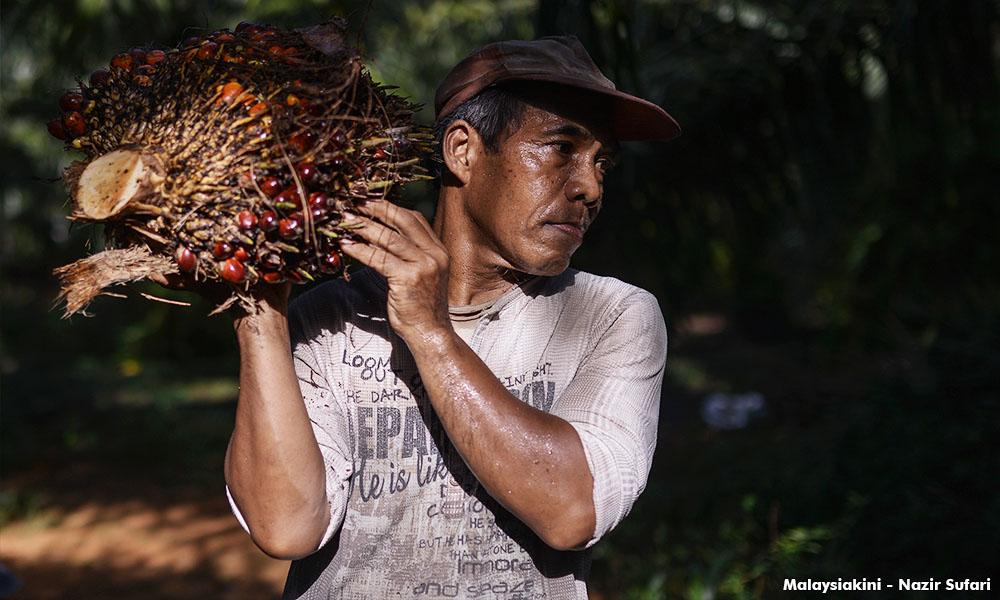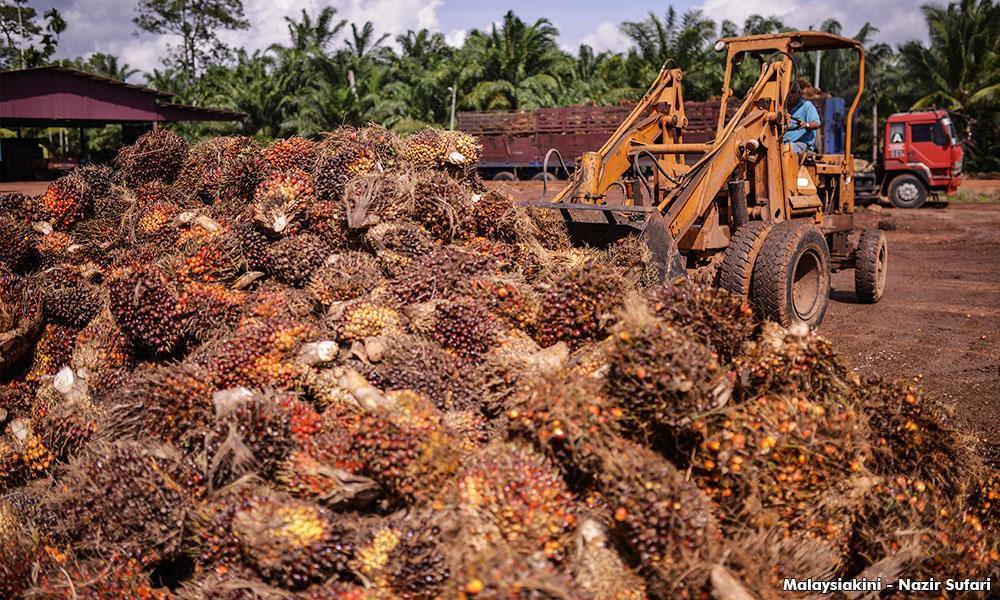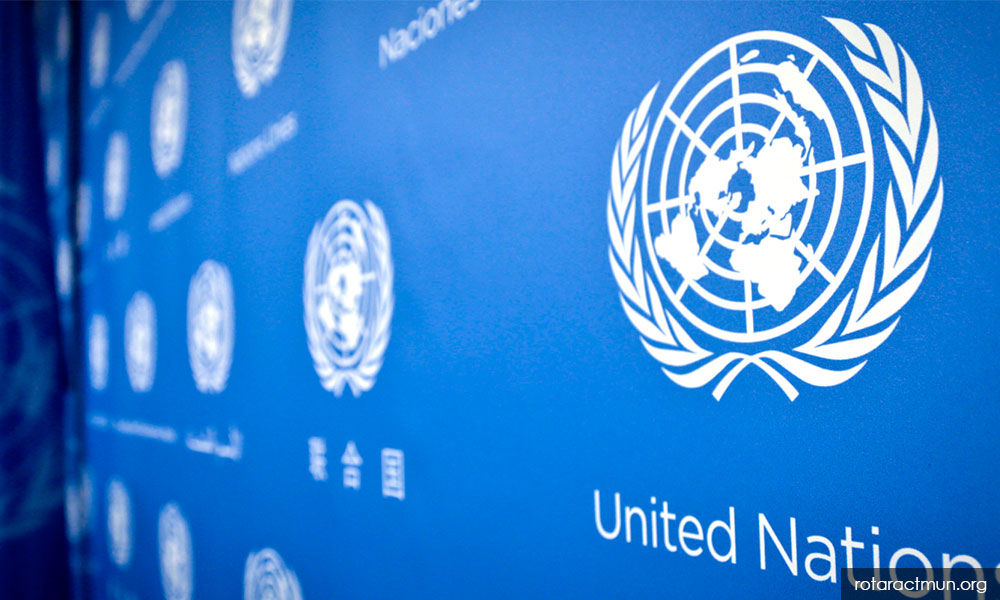COMMENT | It is a fact, a scientific one too, that palm oil can produce more oil than rapeseed or soybean. The yield of palm oil has been proven by agronomists to be "nine times higher than soybean, five times higher than rapeseed and eight times higher than sunflower seed."
The wide spectrum of palm oil can only be due to the species, seed and soil conditions. But, pound for pound, palm oil trounces rapeseed, soybean and sunflower seed, many times over.
However, palm oil can rise up to RM3,600 per tonne or, occasionally drop to RM2,700 per tonne too; the latter when the demand in the international market ebbs.
Come what may, the dollar value of palm oil is higher, and highest, when rapeseed, soybean and sunflower seed are several hundred US dollars more expensive, especially when they are less proficient in producing the necessary oil extract.
What is interesting is that the European Union (EU) already has a commanding position on the rapeseed and soybean markets. The member states command up to 80 percent of the world's market on these two agricultural products alone.
With more scientific breakthroughs in the pipeline, EU can convert more efficient use of rapeseed and soybean into biofuel as well.
Put differently, EU or the EU Parliament does not necessarily have to challenge the supremacy of palm oil per se, when EU has already monopolised the market of rapeseed and soybean. If they did, EU is looking for a total monopoly of rapeseed and soybean, even when palm oil is proven to be more efficient and sustainable.
Thus, to the degree, members of parliament in EU still insist that palm oil should be banned or replaced. The reasons are two.
The EU is either driven by the nefarious attempt to snub out palm oil once and for all, to allow rapeseed and soybean to reign supreme in the commodities market - a possibility Malaysia cannot discount outright - or genuine environmental concerns coming from the left, especially after the signing of the Paris Accord on April 22, 2016 with the effective date beginning Nov 4, 2016.
Either way, Malaysia should be wary of the politics of EU on both issues. Why? Well, the Financial Times reported that EU is a labyrinth of regulations.
Once the members of the European Parliament introduce a resolution to ban anything, the discourse may be internalised and accepted, first by the European Commission, then the European Council of Ministers and eventually by the respective 27 member states of the European Union.

As and when the UK resigns from the EU on March 29, 2019, however, through what is known as "Brexit", the EU will be a collection of 26 countries, no less potent.
If Malaysia is not careful, all 26 countries may have a prejudiced view of Malaysia, indeed, and even lump the palm oil producing methods of Malaysia with Indonesia, even though they are poles apart.
For example, Malaysian plantation owners do not believe in wide-scale open burning that can lead to peat, or relentless bushfires, which is a serious environmental hazard due to the haze that it can generate across the region.
As things stand, however, Malaysia and Indonesia already control up to 90 percent of the palm oil business across the world - with most of Malaysia's processed palm oil going directly to EU, then China and India, all in that order.
And, ideally, they should be sent after two weeks of harvest, in order to ensure the integrity and quality of their oil extract.
Indeed, the environmental practices of Malaysia should be separated from Indonesia too. Yet, the members of the European Parliament have made no distinction between the two.
Due to the geographical proximity of Malaysia and Indonesia, the member states of EU, especially the European Members of Parliament, tend to see Malaysia and Indonesia as one and the same.
Yet, as early as 2004, the Round Table on Sustainable Palm Oil (RSPO) was formed with the objective of promoting the growth and usage of sustainable palm oil products through credible international standards.
Although the standard was initially developed by RSPO; it is accredited as a Certification Body for RSPO with authority to audit and certify an eligible palm oil-related organisation.
However, should 2021 come and go, with neither Malaysia nor Indonesia still able to conform to the sustainable development goals of the United Nations, then the EU is obliged to ban palm oil imports.
This is why, despite the importance of RSPO and Malaysian Sustainable Palm Oil (MSPO), which address sustainability issues and challenges in relation to the multi-stakeholders involvement in the industry which complies with Malaysian laws and ratified international agreements, there is still a need to work closely with UN Development Programme and EU.

Last year, two million tonnes or 15 percent of Malaysia’s palm oil exports, worth RM10.3 billion, were shipped to the EU alone. It goes without saying EU is a major lifeline of Malaysian palm oil.
On the surface, since both Malaysia and Indonesia are faced with the EU ban, it may even look good to work together to remove the ban. But there is a serious flaw in such an argument. Half of Indonesia's palm oil plantations are cultivated by small-time plantation owners.
They cannot, in most cases, afford a rigorous process of certification and sustainability checks. Each test will hold them back, if not add to their cost too. When Indonesia is bushwhacked, so will be palm oil producers in Malaysia.
If anything, Malaysia, on the other hand, is entirely different. If Malaysia makes a concerted effort to work with the UN Development Programme or EU, Putrajaya and the private sector stand a good chance to meet the goals of sustainable development.
However, the key rests with working closely with UNDP and even civil society or consumer groups concerned with either the sustainability or safety of palm oil products, including biofuel.
To do well with UNDP, or, the larger civil society, such as the Third World Network of Martin Khor in Geneva, a paradigm shift has to take place in how Malaysia undertakes its agricultural priorities. The place to begin is not necessarily government-to-government relations alone.
Entities like the Malaysian Palm Oil Council (MPOC) or Malaysian Palm Oil Board (MPOB), can and must work with local NGOs like Anak (Persatuan Anak Peneroka Felda Kebangsaan) to ensure the welfare of the farmers so that their livelihood can be drastically improved.
If the debt burden of the farmers is further reduced, there is no reason for them not to want their palm oil products to be cultivated with organic and sustainable methods that conform to what the UN or EU demand.
Take the 12th of a total of 17 goals of the UNDP's Sustainable Development Plan, for instance. The 12th goal affirms the importance of safe production and consumption of any agricultural product. The point is not just valid but poignantly true.
Seventy percent of the world's water consumption is dedicated to agricultural usage, according to an environmental study. At such rate, the speed and scale at which water tables and rivers would diminish would be faster than the production of agricultural goods.
In turn, the prices of agriculture would also begin to spike, creating a general trend of global inflation; especially when the size of the world's population has already exceeded seven billion people and can reach nine billion by 2050.
In Malaysia, where palm oil is its second major industry, it does not practice sustainable development. Very soon the whole country will be caught in a global income trap, if not a global income debt. Thus, it is to our national interest to avoid any unnecessary friction with the European Parliament.
Rather than to accuse their rapeseed and soybean lobbies of challenging Malaysia's palm oil, Putrajaya should double - even quadruple - its efforts at attaining full compliance with sustainable development.
If it takes up to seven years for the palm oil to reach maturity, it makes sense to urge the planters to try more organic methods to make the eventual fresh fruit bunch even more productive.

If Malaysia cannot compete against rapeseed and soybean, then it makes sense not to persist against them; just as the manner by which Malaysia moved away from the sheer tilling of rubber plantations at one stage to alternative crops now.
Douglas Uggah Embas, the deputy chief minister of Sarawak, affirmed that when the prices of rubber once dropped, Sarawak moved successfully to the planting of pepper in the 1980s.
To the degree the migration of such a method is imbued with challenges, the government may then step in to provide the necessary subsidies and skill set retraining.
Come what may, taking EU to the World Trade Organisation is bound to be long and time-consuming, not forgetting a resource-sapping and expensive exercise. As John Maynard Keynes once said, "in the long term we are all dead".
Nor can Malaysia ban or impose a unilateral embargo on the EU, since their economy far outsizes ours, and Malaysia produces nothing strategic that EU cannot otherwise procure from another Southeast Asia country.
One must remember that Malaysia shares the same climate with many Southeast Asian countries. If Malaysia reacts to EU's potential ban on palm oil with our own embargo, then there will be no shortage of other Southeast Asian countries that will replace Malaysia.
Thus, step one is to stop this illusion that by combining our forces with Indonesia. Putrajaya and Jakarta can undo the prospective ban of EU on palm oil and biofuel by 2021. Indeed, half of Indonesia's plantations can never reach the compliance standards demanded from EU.
Thus it is better to shoot for the higher goal of satisfying the UN Sustainable Development Goals. In order to achieve that, Malaysian society must be democratic and civil too.
Without some modicum of respect granted to civil society, especially Malaysian consumer groups and pro-environment NGOs, Malaysia will always be locked on the twin horns of dilemma, where the state and the EU (which is a body primarily driven by citizen movements and pressure groups, either from the left or right) will always find themselves far apart.
There is no need to challenge EU to a fight in the WTO, or to resort to a mutual tit-for-tat. When Malaysia is pro-sustainable development or pro-UN, our improved agricultural and trade practices will make our products more competitive and profitable than others. EU, they would not be in a position to ban anything from Malaysia.
RAIS HUSSIN is a supreme council member of Parti Pribumi Bersatu Malaysia (PPBM) and head of its policy and strategy bureau.
The views expressed here are those of the author/contributor and do not necessarily represent the views of Malaysiakini.

